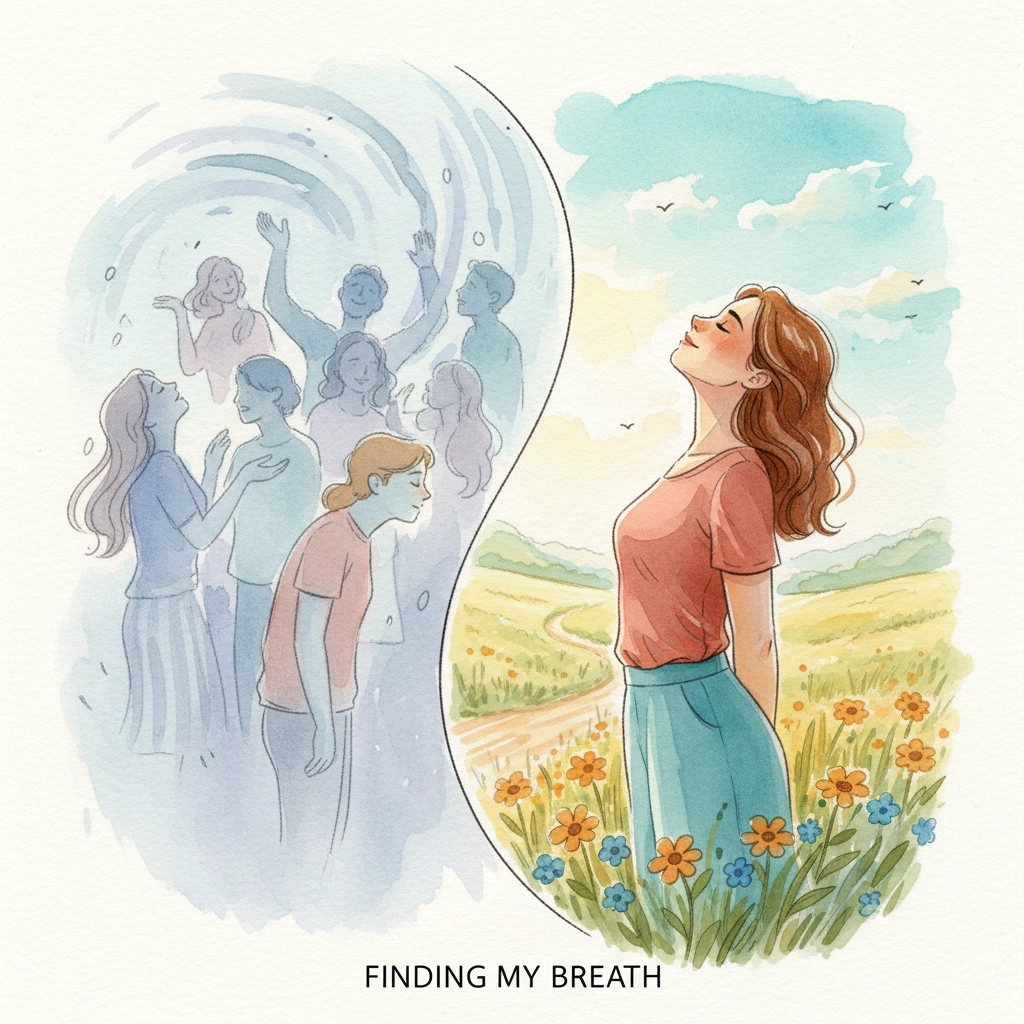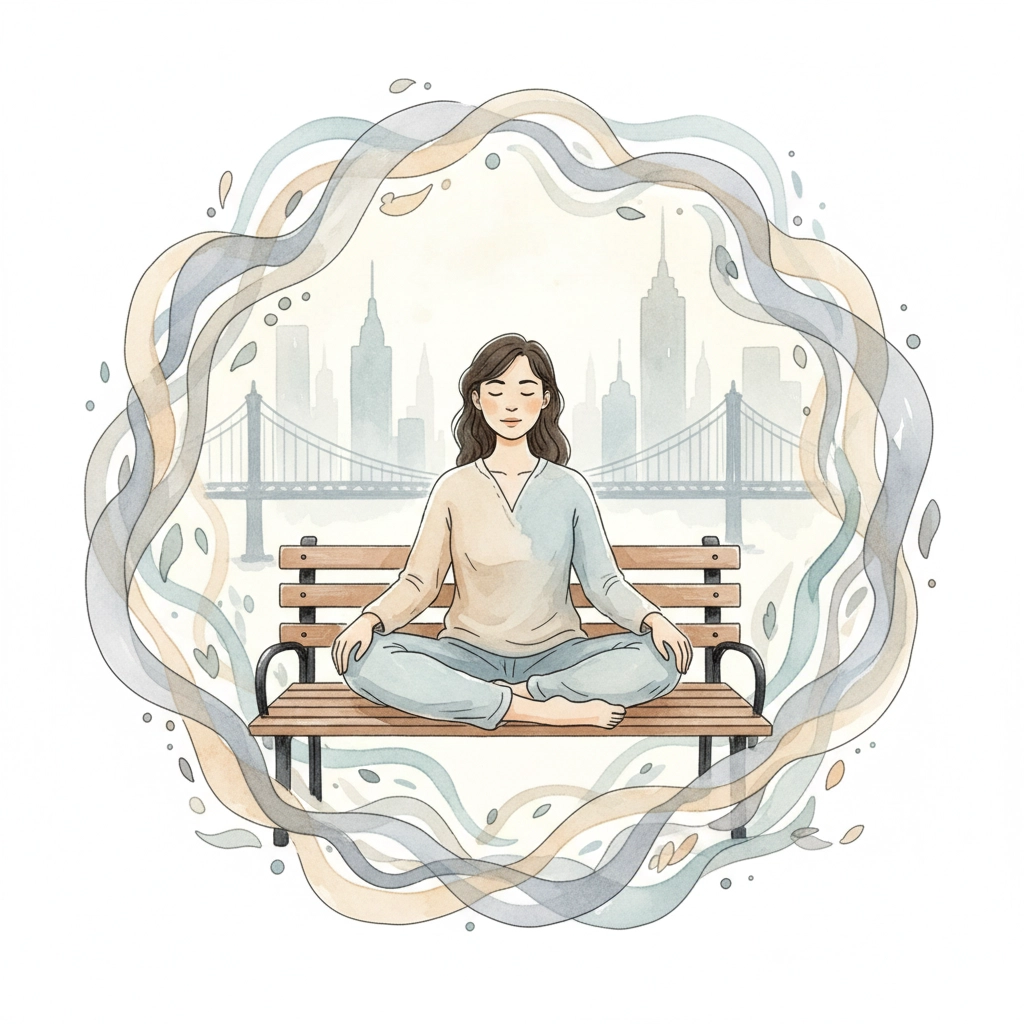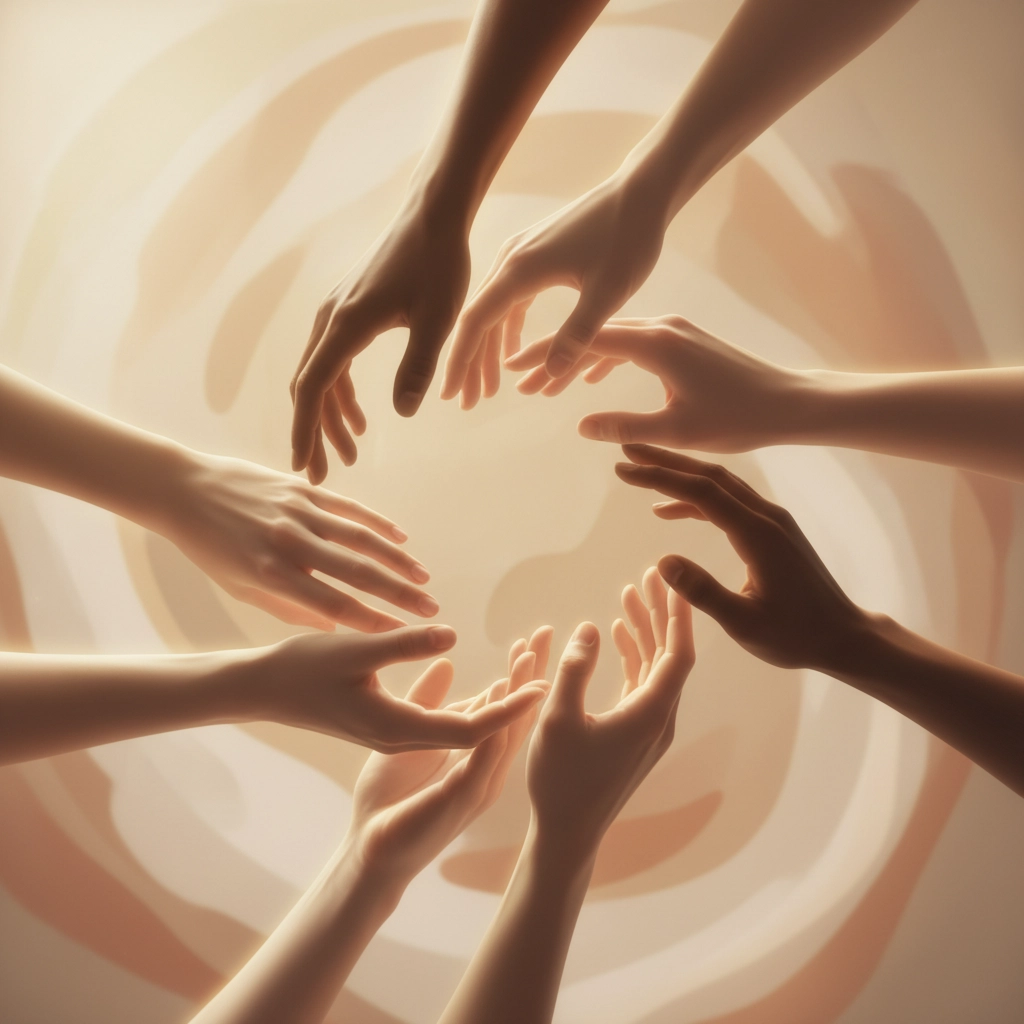by Andrew John Tucker, LCSW, CASAC

Picture this: You’re standing outside a coffee shop, palms sweating, heart racing. Six months ago, you would have had a drink or two before this simple meetup with an old friend. Now, in recovery, that familiar crutch is gone, and you’re facing something that feels impossibly hard, being yourself, stone-cold sober, in a social situation.
If this sounds familiar, you’re definitely not alone. Social anxiety in recovery is one of those challenges that can feel like you’re trying to navigate a minefield while blindfolded. But here’s what I’ve learned working with countless people in recovery here in New York: rebuilding authentic confidence without substances isn’t just possible, it’s one of the most rewarding parts of the recovery journey.
Why Social Anxiety Hits Different in Recovery
Let’s be honest about something: if you used substances to cope with social situations, you’re now essentially relearning how to be human in social settings. It’s like you’ve been wearing social training wheels for years, and now you’re expected to ride the bike without them. No wonder it feels terrifying.
Social anxiety in recovery often feels more intense because substances were likely masking or numbing those anxious feelings for a long time. Without that chemical buffer, you’re experiencing the full intensity of social anxiety, maybe for the first time in years. Research shows that people with substance use disorders have significantly higher rates of social anxiety disorder, with studies indicating co-occurrence rates as high as 48% (Buckner et al., 2008).
What makes this particularly challenging is that you’re not just dealing with garden-variety social anxiety, you’re also managing recovery, which comes with its own set of social complexities. You might worry about explaining why you’re not drinking, feel different from others who can casually have a glass of wine, or struggle with identity questions like “Who am I without substances?”

The Foundation: Self-Awareness and Self-Acceptance
Here’s something that might sound counterintuitive: building confidence starts with getting comfortable with being uncomfortable. Before we can tackle the social stuff, we need to do some foundational work on understanding ourselves.
Self-awareness means getting curious about your specific triggers. What social situations make your palms sweat? Is it large groups, one-on-one conversations, work events, or casual hangouts? Maybe it’s specific times of day when you used to drink, or certain types of people who intimidate you. Understanding your patterns is the first step in developing effective coping strategies (Hofmann, 2007).
But here’s the kicker, self-awareness without self-acceptance is like having a map but refusing to acknowledge where you are on it. Self-acceptance means recognizing that having social anxiety doesn’t make you broken or weak. It makes you human. You can’t build lasting confidence on a foundation of self-criticism and shame.
I often tell my clients: “You wouldn’t berate a friend for having asthma, so why are you giving yourself hell for having anxiety?” Self-acceptance isn’t about giving up or making excuses, it’s about creating a stable foundation for growth.
Evidence-Based Strategies That Actually Work
Let’s talk about some tools that have solid research behind them. Cognitive Behavioral Therapy (CBT) is like the Swiss Army knife of anxiety management in recovery. CBT helps you identify the thought patterns that fuel social anxiety and teaches you to challenge those doom-and-gloom predictions your brain loves to make (Heimberg et al., 2010).
For example, if your brain is telling you “Everyone will notice I’m not drinking and judge me,” CBT helps you reality-test that thought. How many people actually notice what others are drinking? Of those who do notice, how many actually care? And of those who care, how many would judge you negatively for making a healthy choice?
Exposure therapy is another powerhouse technique, though I know it sounds about as appealing as a root canal. But here’s the thing, gradual exposure to feared social situations, combined with relaxation techniques, has been shown to significantly reduce social anxiety symptoms (Wolitzky-Taylor et al., 2008).
The key word here is gradual. We’re not talking about jumping into the deep end of the social pool. Maybe you start with a quick coffee with your most understanding friend, then work up to small group dinners, and eventually tackle larger social events. Each successful experience builds your confidence bank account.

Practical Tools for the Real World
Now let’s get into the nuts and bolts of managing social anxiety without substances. Mindfulness techniques can be absolute game-changers. When you practice observing your anxious thoughts without getting swept away by them, you create space between you and your anxiety (Koszycki et al., 2007).
Here’s a simple technique I teach: the 5-4-3-2-1 grounding method. When anxiety hits, identify 5 things you can see, 4 things you can touch, 3 things you can hear, 2 things you can smell, and 1 thing you can taste. It sounds almost too simple, but it works by pulling you out of your anxious head and into the present moment.
Deep breathing isn’t just hippie nonsense: it’s backed by solid research. When you’re anxious, your breathing becomes shallow, which actually makes anxiety worse. Slow, deep breathing activates your parasympathetic nervous system, literally telling your brain to calm down (Ma et al., 2017).
For those New York moments when you need quick relief: maybe you’re on a crowded subway heading to a social event: try the 4-7-8 technique: breathe in for 4 counts, hold for 7, exhale for 8. It’s discrete enough to do anywhere.
The Power of Preparation
One of the most practical strategies I’ve found is what I call “strategic preparation.” Before heading into social situations, give yourself some tools:
- Have conversation topics ready: Read the news, think about current events, or prepare a few questions about others’ lives. Having a mental toolkit reduces the panic of “What if I have nothing to say?”
- Practice your story: If you’re worried about questions about your sobriety, practice a few comfortable responses. “I’m taking a break from drinking” or “I’m focusing on my health right now” work perfectly fine.
- Set realistic goals: Maybe your goal for a party isn’t to be the life of the party: maybe it’s just to have one meaningful conversation or to stay for 30 minutes. Small wins build confidence.

Lifestyle Factors That Make a Difference
Here’s something that might surprise you: what you do outside of social situations significantly impacts how you feel in them. Regular exercise has been shown to be as effective as some medications for reducing anxiety symptoms (Herring et al., 2010). In a city like New York, you’ve got endless options: Central Park runs, yoga classes, climbing gyms, or even just walking the High Line.
Sleep quality is another huge factor. People with social anxiety often struggle with sleep, and poor sleep makes anxiety worse: it’s a vicious cycle. Research shows that even one night of poor sleep can increase anxiety levels the next day (Meerlo et al., 2008).
And let’s talk about caffeine. I know, I know: asking a New Yorker to limit coffee is like asking them to stop breathing. But caffeine can significantly worsen anxiety symptoms, especially at higher doses. If you’re struggling with social anxiety, consider switching to decaf after your morning cup or limiting yourself to one coffee per day.
Building Your Support Network
One of the most powerful tools in managing social anxiety is having the right people in your corner. Support groups specifically for people in recovery can be incredibly valuable. Whether it’s AA, NA, SMART Recovery, or specialized anxiety groups, being around others who understand your struggles reduces isolation and provides practical coping strategies.
In New York, there are numerous recovery communities and mental health therapy NYC resources. Finding your tribe might take some trial and error, but when you connect with people who get it, the difference is profound.
Don’t underestimate the power of one-on-one relationships either. Having even one person you can text before a social event who understands your anxiety can make all the difference. This person becomes your anchor: someone who can provide encouragement, reality-testing, or even an exit strategy if needed.
The Long Game: Building Authentic Confidence
Here’s what I’ve observed working as an addiction therapist NYC: the confidence you build in recovery, though it takes longer to develop than liquid courage, is infinitely more reliable and genuine.
Authentic confidence comes from repeatedly proving to yourself that you can handle difficult situations. Every social event you navigate successfully, every conversation you have sober, every moment you choose to stay present instead of numbing out: these experiences accumulate into genuine self-trust.
This process takes time, and there will be setbacks. You might have social interactions that feel awkward or conversations that don’t go well. That’s not failure: that’s data. Each experience teaches you something about yourself and your capabilities.

Moving Forward with Compassion
As you navigate social anxiety in recovery, remember that this is a process, not a destination. Some days will feel easier than others, and that’s completely normal. The goal isn’t to never feel anxious: it’s to develop the tools and confidence to navigate anxiety without compromising your recovery.
Be patient with yourself as you rebuild your social confidence. You’re essentially learning a new language: the language of sober social interaction. Like any new language, it takes practice, patience, and lots of self-compassion.
Recovery is already one of the most courageous things you can do. Adding the challenge of managing social anxiety without substances? That takes even more courage. But here’s what I know from years of working in this field: you have more strength and resilience than you realize.
Your journey to authentic social confidence starts with a single step: and you’ve already taken many of those by choosing recovery. Keep going. The person you’re becoming is worth every uncomfortable moment along the way.
References:
Buckner, J. D., Schmidt, N. B., Lang, A. R., Small, J. W., Schlauch, R. C., & Lewinsohn, P. M. (2008). Specificity of social anxiety disorder as a risk factor for alcohol and cannabis dependence. Journal of Psychiatric Research, 42(3), 230-239.
Heimberg, R. G., Liebowitz, M. R., Hope, D. A., & Schneier, F. R. (2010). Social anxiety disorder: From understanding to treatment. Guilford Press.
Herring, M. P., O’Connor, P. J., & Dishman, R. K. (2010). The effect of exercise training on anxiety symptoms among patients. Archives of Internal Medicine, 170(4), 321-331.
Hofmann, S. G. (2007). Cognitive factors that maintain social anxiety disorder: A comprehensive model and its treatment implications. Cognitive Behaviour Therapy, 36(4), 193-209.
Koszycki, D., Benger, M., Shlik, J., & Bradwejn, J. (2007). Randomized trial of a meditation-based stress reduction program and cognitive behavior therapy in generalized social anxiety disorder. Behaviour Research and Therapy, 45(10), 2518-2526.
Ma, X., Yue, Z. Q., Gong, Z. Q., Zhang, H., Duan, N. Y., Shi, Y. T., … & Li, Y. F. (2017). The effect of diaphragmatic breathing on attention, negative affect and stress in healthy adults. Frontiers in Psychology, 8, 874.
Meerlo, P., Sgoifo, A., & Suchecki, D. (2008). Restricted and disrupted sleep: effects on autonomic function, neuroendocrine stress systems and stress responsivity. Sleep Medicine Reviews, 12(3), 197-210.
Wolitzky-Taylor, K. B., Horowitz, J. D., Powers, M. B., & Telch, M. J. (2008). Psychological approaches in the treatment of specific phobias: a meta-analysis. Clinical Psychology Review, 28(6), 1021-1037.
